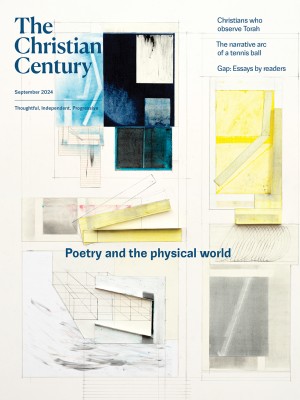Which church is dying?
The church of empire might be. But I’m not ready to call time of death on the mystical body of Christ.

(Illustration by Nicholas Blechman)
“You understand that the church is dying, don’t you?” I’ve been asked this question often since I enrolled in seminary last year. The well-intentioned people who ask do so out of genuine concern. As far as they can tell, I’ve lost my capacity for sound vocational judgment. I’ve essentially boarded the Titanic, and I need urgent protection from my own naïveté.
I don’t blame them; I worry about the future, too. Will my classmates and I find sustainable jobs? Will we have to juggle multiple ministry settings to earn a living? Are bivocational pastors the only people who will survive this sea change?
Read our latest issue or browse back issues.
The mainline Protestant church’s struggles are hardly news; the numbers have looked ominous for decades. But the level of fear, grief, and resignation I encounter these days does feel new and different. It’s one thing to grieve the closing of individual churches and quite another to pronounce the demise of the church. One thing to mourn empty pews and shuttered Sunday school classrooms and quite another to call time of death on the mystical body of Christ. Call me naive if you’d like, but I’m not quite ready to do the latter.
Why? Because the hopes, hungers, losses, and loves that have brought people to their knees for two millennia are still alive and well. Whether we use religious language to describe it or not, we are starving for coherence, for awe, for connection, for meaning. We are still hungry for spaces, rituals, and rhythms that will help us beat despair and recover wonder. We need questions worth pondering and truths worth trusting. We still need containers spacious enough to hold our pain.
In other words, we still need what Jesus’ life, death, and resurrection called into being 2,000 years ago. We still need what the Spirit of God ignited at Pentecost. We still need the church.
Will the church have the courage to be a seed that willingly falls into the ground and dies?
So the question is not whether the church is dying; it’s whether the church will have the courage and humility to become once again what God has always called it to be: a seed that willingly falls into the ground and dies so that new life can nourish the world. What we don’t need is a church that refuses to die in this way. A church aligned with Christendom and wedded to Whiteness, colonialism, patriarchy, wealth, entitlement, and prestige. That church needs to die.
I wasn’t raised in the mainline, but I do know what the church of empire, as Stephanie Spellers calls it, looks and feels like. As a little girl growing up immersed in religious spaces, I learned early on how to nestle deep into complacency and comfort. I learned what it feels like to occupy a place in the wider culture that is safe, well regarded, and even fashionable. What it feels like to take belonging for granted.
This comfortable church is the one many of us in the West can’t let go of. The church we are so often bent on resuscitating is a church that operates from the center of power, wielding broad influence in the culture. It’s a church packed to the rafters every Sunday, not necessarily with people who are hungry for Jesus but with people who recognize that regular attendance offers them valuable cultural capital. When people mourn the death of the church, it is often this funeral they’re attending.
I don’t write these words glibly; I know that any death stings. Surrendering the center is no easy thing. It hurts to get sidelined, to let go of privilege. It hurts to find ourselves in the shadows when we’ve loved the limelight for a long, long time. It hurts, in other words, to remember and return to the language Jesus uses to describe the kingdom of God: the language of smallness, subtlety, and patience. A mustard seed. A bit of yeast. A lost coin.
Maybe the surprise isn’t that the church of empire is dying but that we, the followers of a suffering servant, have insisted on keeping it alive for this long. In those Spirit-filled moments when I manage to lay down my sorrows and fears even briefly, I recall that the church has always been most incisive, most Christlike, when it occupies the margins. It is in our decenteredness that we have loved the world most fiercely and freely. It is from the shadows that Christ’s light has emanated from our midst with truly transformative radiance.
The cycle of death and resurrection, in other words, has always been our wheelhouse. It has always constituted our closest point of contact with the Divine. In contrast, power has never served the body of Christ well. And prestige? Prestige has been the bane of our existence.
Many of us who enter into ministry in the coming years will preside over the deaths of churches. We will walk alongside the brokenhearted as they say goodbye to sanctuaries they’ve loved, memorial gardens they’ve tended, choir lofts they’ve filled with faith-filled voices. We will wade through the minutiae of shrinking budgets and crumbling buildings. We will weave ritual into the making of memories, hoping that our parishioners will make soft landings after the upheavals of loss. We will model, as best we can, what it looks like to let go. We will breathe, weep, pray, and close doors.
I am convinced that in all of these holy things, God will still be with us. The church, which is God’s and not ours, will still be with us. And the Spirit who reigns over the church in each of its deaths and resurrections will do what she has always done: blow where she wills, full of mischief and mystery. She will show us the way forward when we least expect to find our footing one more time. She will teach us once again how to laugh. And she will make all things new.







